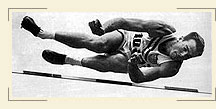|
 Did you know?
Did you know?
- Fanny Blankers-Koen continued to compete for several more years after the 1948 Olympics quite successfully. Two years after her triumph in  London she participated in the European track and field championship winning the first place in the 100m and the 80m hurdles, and the second place in the 200m and the 4x100m relay. She won a total of 8 European medals: two bronze (1938), two silver (1950) and four gold (1946, 1950). She also participated in the 1952 Helsinki Olympics, but did not get any distinction due to a disease that had not allowed her to prepare properly. Despite all that, she pursued sport and at the age of 38, in 1956, her performance in the 80m hurdles was 11.30, very close to the world record she had set a few years earlier (11.00) and to the performance that had given her a gold medal and an Olympic record in the Games of 1948 (11.25). In her career she set 20 world records altogether in the sprints, in the high hurdles, in the high jump, the long jump and the pentathlon. London she participated in the European track and field championship winning the first place in the 100m and the 80m hurdles, and the second place in the 200m and the 4x100m relay. She won a total of 8 European medals: two bronze (1938), two silver (1950) and four gold (1946, 1950). She also participated in the 1952 Helsinki Olympics, but did not get any distinction due to a disease that had not allowed her to prepare properly. Despite all that, she pursued sport and at the age of 38, in 1956, her performance in the 80m hurdles was 11.30, very close to the world record she had set a few years earlier (11.00) and to the performance that had given her a gold medal and an Olympic record in the Games of 1948 (11.25). In her career she set 20 world records altogether in the sprints, in the high hurdles, in the high jump, the long jump and the pentathlon.
- In the final of the women's 80m hurdles the first two winners finished almost simultaneously, with exactly the same time, which was a new Olympic record (11.25). Eventually, the winner was Fanny Blankers-Koen, and British athlete Maureen Gardner was runner-up, who was the only athlete that gave Blankers-Koen a hard time in the Games of 1948. What is more, they both had the same trainer, Jan Blankers, Fanny's husband. In the same race, the Australian Shirley Strickland finished in the third place, with a time of 11.30. Strickland came third in the 100m as well, but won the second place in the 4x100m relay. The winner of both races was Blankers-Koen. In the 4x100m relay, Blankers-Koen ran the anchor leg on her team and was in the third place when she got hold of the baton, several metres behind the Australian team that had the lead and the Canadian team that followed in the second place. The final winner, though, was Blankers-Koen and the Dutch team.
- Bob Mathias could have won a third Olympic medal in 1956. Mathias was the first decathlete in the history of the Olympic Games to have won a gold medal two times in a row: in the 1848 London Games and in the 1952 Helsinki Games. Right after the Helsinki Games, Mathias gave up competitive sport, when he was just 21 years old. Four years later, and while he worked as an actor, he wanted to participate in the preliminary Games for the 1956 Melbourne Olympics. The USA federation replied that they would give him the right to participate in the preliminaries, on condition that he returned the money he had earned as an actor. Mathias refused, thus missing the opportunity to take part and get a distinction in three consecutive Olympic organizations.
|